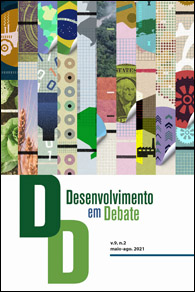Estado e desenvolvimentismo na perspectiva de Ha-Joon Chang: quando a história importa e as instituições fazem diferença
Palavras-chave:
Estado, mercado, instituições, capitalismo, desenvolvimentismo.Resumo
O objetivo deste texto foi destacar os aspectos fundamentais no que se refere à importância das instituições e da mudança institucional para o desenvolvimento, na perspectiva de Ha-Joon Chang. Considera-se o papel do estado enquanto agente transformador estrutural, destacando-se a relevância da sua abrangência institucional. Para Chang, o capitalismo, enquanto “sistema socioeconômico”, não pode ser considerado uma “coleção de mercados”. Existiria uma primazia institucional do estado em relação aos mercados, na medida em que aquele possui um caráter desenvolvimentista. Chang defende a manutenção desse caráter desenvolvimentista do estado como um recurso necessário ao emparelhamento buscado pelas economias em desenvolvimento. Neste sentido, Chang entende que as instituições promotoras do desenvolvimento decorrem de processos associados às mudanças produtivas, por isto não deveriam ser adotadas a partir de um “padrão global”, em que as mesmas instituições serviriam, ao mesmo tempo, para economias desenvolvidas e em desenvolvimento.
Downloads
Referências
CHANG, H-J. State, institutions and structural change. Structural Change and Economic Dynamics, Cambridge-UK, v. 5, n. 2, pp. 293-313, 1994.
CHANG, H-J. The economics and politics of regulation. Cambridge Journal of Economics, v, 21, p. 703-729, 1997a.
CHANG, H-J. An institutionalist perspective on the role of the state - towards an institutionalist political economy. In: BURLAMAQUI, L.; CASTRO, A. & CHANG, H-J. (Eds.). Institutions and the Role of the State. Edward Elgar. First Draft: October 1997b.
CHANG, H-J. The economic theory of developmental state. In: WOO-COMINGS, M. (Ed.). The developmental state. Ithaca and London: Cornell University Press, 1999, pp. 182-199.
CHANG, H-J. Breaking the mould: an institutionalist political economy alternative to the neoliberal theory of the market and the state. Social Policy and Development Programme. UNRISD Paper n. 6, may 2001. Disponível em: https://bit.ly/3iBD88q. Acesso em: 17 mar. 2020.
CHANG, H-J. Chutando a escada: a estratégia do desenvolvimento em perspectiva histórica. São Paulo: UNESP, 2004a.
CHANG, H-J. State, institutions and structural change. In: CHANG, H-J. Globalisation, economic development and the role of the state. London and New York: Zed Books, 2004b, pp. 45-74.
CHANG, H-J. An institutionalist perspective on the role of the state: towards an institutionalist political economy. In: CHANG, H-J. Globalisation, economic development and the role of the state. London and New York: Zed Books, 2004c. pp. 75-103.
CHANG, H-J. Understanding the relationship between institutions and economic development – some key theoretical issues. In: CHANG, H-J. (Ed.). Institutional change and economic development. New York: United Nations University Press, 2007, pp. 17-33.
CHANG, H-J. Hamlet without the prince of Denmark: how development has disappeared from today’s ‘development’ discourse. Forthcoming (2010) In: S. Khan & J. Christiansen (Eds.). Towards New Developmentalism: Market as Means rather than Master. Routledge, Abingdon. 15 February 2009a version.
CHANG, H-J. Maus samaritanos: o mito do livre-comércio e a história secreta do capitalismo. Rio de Janeiro: Elsevier, 2009b.
CHANG, H-J. Institutional and economic development: theory, policy and history. Journal of Institutional Economics, v. 7, n.4, p. 473-498, 2011.
CHANG, H-J. & ANDREONI, A. Institutions and the process of industrialisation: towards a theory of social capability development. In: NISSANKE, M. & OCAMPO, J. A. (Eds.). The palgrave handbook of development economics: critical reflections on globalisation and development. Switzerland: Palgrave Macmillan, 2019. pp. 422-439
CHANG, H.-J. & EVANS, P. The Role of Institutions in Economic Change. In: DYMSKI, G. and DA PAULA, S. (Eds.). Reimagining Growth. London: Zed Press, 2005. pp. 99–129.
FREEMAN, C; PEREZ, C. Structural Crises of Adjustment, Business Cycles and Investment Behaviour. In: DOSI, G. et al. (Eds.). Technical Change and Economic Theory. London: Francis Pinter, 1988.
FRIEDMAN, M. Capitalismo e liberdade. Rio de Janeiro: Nova Cultural, 1985.
HODGSON, G. M. Downward causation - some second thoughts. Watford (UK). Disponível em: https://bit.ly/3kZkAln.
Acesso em: ago. 2019.
HODGSON, G. M. Institutions and individuals: interaction and evolution. Organization Studies, Thousand Oaks (USA), v. 28, n. 1, p. 95-116, 2007.
LIST, G. F. Sistema Nacional de economia política. São Paulo: Nova cultural, 1989.
MAZZUCATO, M. O Estado empreendedor: desmascarando o mito do setor público vs. setor privado. São Paulo: Portfolio-Penguin, 2014.
NORTH, D. C. Institutions, institutional change and economic performance. Cambridge: Cambridge University Press, 1990.
NORTH, D. C. Institutions. The Journal of Economic Perspective, v. 5, n. 1, pp. 97-112, winter 1991.
NORTH, D.C. Understanding the process of economic change. Princeton/Oxford: Princeton University Press, 2005
NORTH, D., WALLIS, J. & WEINGAST, B. Violence and Social Orders: A Conceptual Framework for Interpreting Recorded Human History. Cambridge: Cambridge University Press, 2009.
PÉREZ, C. Revoluciones tecnológicas y capital financiero: la dinâmica de las grandes burbujas financieras y las épocas de bonanza. México: Siglo XXI, 2004.
WILLIAMSON, O. E. Las instituciones económicas del capitalismo. México: FCE, 1989.
Downloads
Publicado
Edição
Seção
Licença

Este trabalho está licenciado sob uma licença Creative Commons Attribution 4.0 International License.

